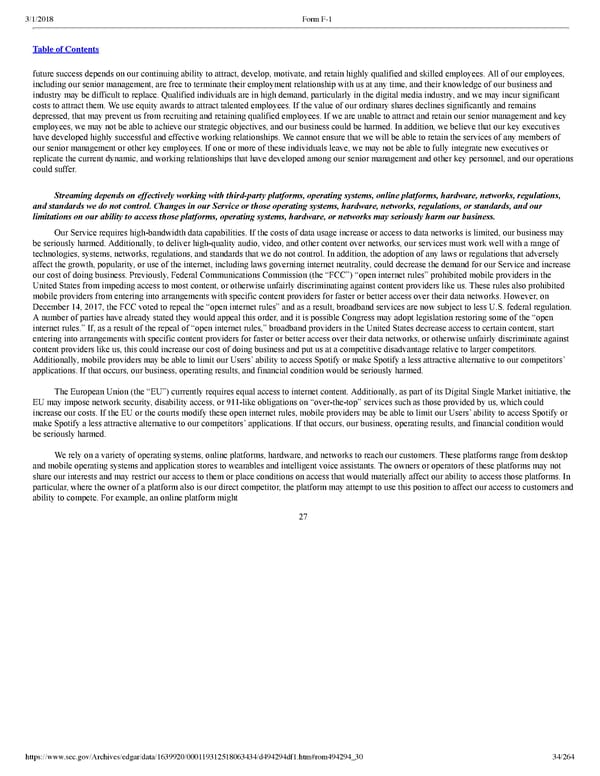34/264 future success depends on our continuing ability to attract, develop, motivate, and retain highly qualified and skilled employees. All of our employees, including our senior management, are free to terminate their employment relationship with us at any time, and their knowledge of our business and industry may be difficult to replace. Qualified individuals are in high demand, particularly in the digital media industry, and we may incur significant costs to attract them. We use equity awards to attract talented employees. If the value of our ordinary shares declines significantly and remains depressed, that may prevent us from recruiting and retaining qualified employees. If we are unable to attract and retain our senior management and key employees, we may not be able to achieve our strategic objectives, and our business could be harmed. In addition, we believe that our key executives have developed highly successful and effective working relationships. We cannot ensure that we will be able to retain the services of any members of our senior management or other key employees. If one or more of these individuals leave, we may not be able to fully integrate new executives or replicate the current dynamic, and working relationships that have developed among our senior management and other key personnel, and our operations could suffer. Streaming depends on effectively working with thirdparty platforms, operating systems, online platforms, hardware, networks, regulations, and standards we do not control. Changes in our Service or those operating systems, hardware, networks, regulations, or standards, and our limitations on our ability to access those platforms, operating systems, hardware, or networks may seriously harm our business. Our Service requires highbandwidth data capabilities. If the costs of data usage increase or access to data networks is limited, our business may be seriously harmed. Additionally, to deliver highquality audio, video, and other content over networks, our services must work well with a range of technologies, systems, networks, regulations, and standards that we do not control. In addition, the adoption of any laws or regulations that adversely affect the growth, popularity, or use of the internet, including laws governing internet neutrality, could decrease the demand for our Service and increase our cost of doing business. Previously, Federal Communications Commission (the “FCC”) “open internet rules” prohibited mobile providers in the United States from impeding access to most content, or otherwise unfairly discriminating against content providers like us. These rules also prohibited mobile providers from entering into arrangements with specific content providers for faster or better access over their data networks. However, on December 14, 2017, the FCC voted to repeal the “open internet rules” and as a result, broadband services are now subject to less U.S. federal regulation. A number of parties have already stated they would appeal this order, and it is possible Congress may adopt legislation restoring some of the “open internet rules.” If, as a result of the repeal of “open internet rules,” broadband providers in the United States decrease access to certain content, start entering into arrangements with specific content providers for faster or better access over their data networks, or otherwise unfairly discriminate against content providers like us, this could increase our cost of doing business and put us at a competitive disadvantage relative to larger competitors. Additionally, mobile providers may be able to limit our Users’ ability to access Spotify or make Spotify a less attractive alternative to our competitors’ applications. If that occurs, our business, operating results, and financial condition would be seriously harmed. The European Union (the “EU”) currently requires equal access to internet content. Additionally, as part of its Digital Single Market initiative, the EU may impose network security, disability access, or 911like obligations on “overthetop” services such as those provided by us, which could increase our costs. If the EU or the courts modify these open internet rules, mobile providers may be able to limit our Users’ ability to access Spotify or make Spotify a less attractive alternative to our competitors’ applications. If that occurs, our business, operating results, and financial condition would be seriously harmed. We rely on a variety of operating systems, online platforms, hardware, and networks to reach our customers. These platforms range from desktop and mobile operating systems and application stores to wearables and intelligent voice assistants. The owners or operators of these platforms may not share our interests and may restrict our access to them or place conditions on access that would materially affect our ability to access those platforms. In particular, where the owner of a platform also is our direct competitor, the platform may attempt to use this position to affect our access to customers and ability to compete. For example, an online platform might 27
 Spotify F1 | Interactive Prospectus Page 33 Page 35
Spotify F1 | Interactive Prospectus Page 33 Page 35